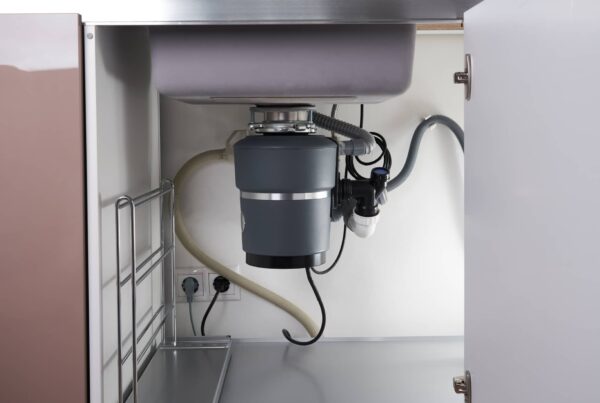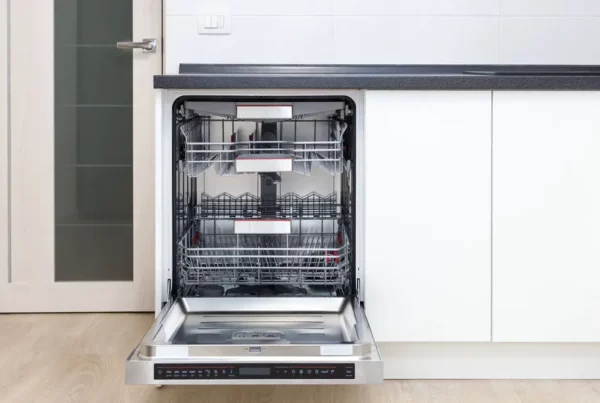
Having a dishwasher in your home can be considered a blessing. Simply put, the homeowner spends less time washing the dishes by hand. Additionally, current dishwashers are great at saving water and providing a variety of functions. The ability of a dishwasher to work independently is great. Do dishwashers heat the water? Yes, the sensors that are in the dishwasher communicate to the heating element when to heat the water.
Keep in mind, that water temperatures can go from 130 to 140 degrees Fahrenheit. Let’s take a look below at some more details regarding your dishwasher.
What Is A Dishwasher?
Dishwashers were invented in 1850. The original dishwasher was a wooden box that used a wheel or spray arm that splashes water on the dirty dishes. Also, the dishwasher has scrubbers that help remove the food particles from the dishes. With the capability to heat its water, the dishwasher is able to kill bacteria that are located inside the dishwasher. The dishwasher uses a hot water supply to disinfect the dishes and gives you the ability to eat and drink off of clean dishes. The average lifespan of a dishwasher is between 6 and 10 years.
How Does A Dishwasher Function?
Dishwashers provide a variety of functions. Depending on the type of dishwasher determines how the water hookup goes and what the rinse cycle entails. Also, the use of warm water and cold water is determined by the internal thermostat of the dishwasher. Let’s take a look below at the functionality of a modern dishwasher.
-
- Capable of heating the water to the necessary temperature
- Can automatically open the detergent dispenser when it’s needed
- Drains the dirty water
- High pressure pushes the hot water through the jets in the dishwasher
- The sprayer in the dishwasher rinses all of the dishes
- Is capable of draining itself
- Can add water to the wash cycle that requires it
- Heats the air to dry the dishes
Other Functions Like The Sensors and Timers in a Dishwasher
Dishwashers use sensors and timers to ensure that each function is completed promptly. The built-in timers tell the dishwasher how long each cycle should run. The sensors are needed to adjust the temperature of the water and ensure that the dishes are cleaned and not damaged. Additionally, the sensors in the dishwasher maintain the water levels in the dishwasher. They keep the dishwasher from overflowing while it is running its cycles. Also, the last sensor monitors the water for how dirty it can get. Consequently, the sensors will also let the dishwasher know when the dishes are clean and the cycle is over.

How Is A Dishwasher Hooked Up?
The dishwasher is hooked up to the hot water line that is connected to your sink. This plumbing connection has two valves. One valve is for the sink and the other valve is for the dishwasher. Be sure that the dishwasher is hooked up correctly. If you aren’t sure how to hook up a dishwasher, utilize a professional.
What Keeps The Water Hot In The Dishwasher?
The pipe that runs from the dishwasher to the hot water valve is a flexible copper tubing. The reason for this type of tubing being used is to insulate the water and keep it hot as it flows to the dishwasher. The flexible piping is connected by ferrules and compression fittings. This ensures that there are no leaks.
Once you have loaded the dishwasher and before you start running it, you will want to run the hot water into your sink. Adding the hot water into the sink allows the dishwasher to have hotter water for the dishes to get cleaned. Running the hot water ahead of time also lets the dishwasher heat the water faster.
Other Recommended Maintenance
Now that you know how a dishwasher heats the water and keeps it hot, you can read up on how long it takes to install the dishwasher. Knowing this information will allow you to plan your day and not miss time from work.
Next, if you have a dishwasher and it begins to leak, there are a few reasons for this to occur. Be sure to read up on how to unclog a dishwasher that is leaking.
Lastly, be sure to read up on what you can put inside your garbage disposal. The disposal lines are connected under the sink, just like the dishwasher is. You will want to avoid clogging the garbage disposal and having a backflow into your dishwasher.

When Do I Call A Professional?
Once your new dishwasher is delivered, you will likely need a professional to hook it up. Master plumbers and licensed electricians are just two professionals capable of installing a new dishwasher. Also, if your current dishwasher has issues, you can call on either professional to assist. Use the manufacturer’s manual to troubleshoot any problems before reaching out to a professional.
Conclusion
Your dishwasher comes with a sensing unit that will heat the water. Always be cognizant of when the dishwasher is running. Avoiding showers or the use of your washing machine at the same time as the dishwasher is a good idea. Call Waypoint Property Inspection to inspect your home in Tampa, St. Petersburg, Lakeland, Orlando, Palm Beach, Ft. Lauderdale, and surrounding areas.



